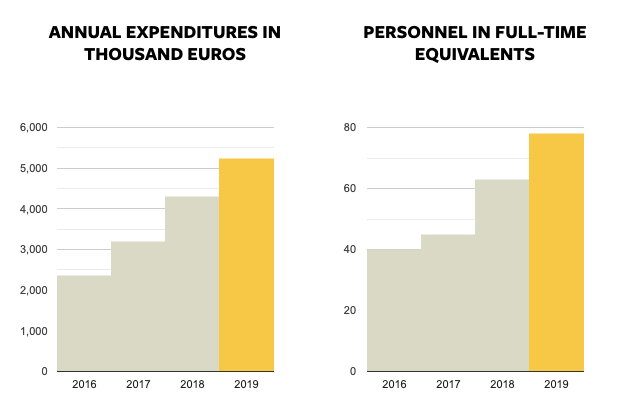REGIONAL COMMODITY PROGRAMMES
COFFEE
he 7,850 lead farmers we trained since our coffee programme launched two years ago, have reached out to a further 106,566 small-scale farmers in the region. We noted a 35% increase in farmer incomes in 2019, despite falling coffee prices. Over 20% of the youth we worked with this year are now deriving incomes from job opportunities in nursery management, coffee varietal conversion, and integrated soil fertility management.

DAIRY
Through our FOSEK and Oromia projects, we trained 11,000 coffee farmers in Kenya and Ethiopia to diversify into dairy this year. As part of the F4APK project, cooperatives in Kenya benefited from new cooling tanks and information management systems. Over ten million litres of milk were aggregated through the cooperatives. And in Tanzania, 140 farmers (36% women) were trained in animal husbandry and business skills as part of the Dairy-2025 project.

FRUIT & VEGETABLES
More than 21,000 farmers adopted good practices, including safe use of herbicides, efficient irrigation systems, and post-harvest technologies. About 11,668 people registered for our Farmers Realm app, a two-way platform that provides information and links to experts. At a workshop for our Follow the Food project in Kenya, we shared findings on inclusive agribusinesses and highlighted the role small and medium enterprises play in food security in local communities.

GOLD
We continued to support artisanal and small-scale mining (ASM) in Kenya, Tanzania and Uganda. In the Anti-Child Labour in ASM Gold Mines project in Uganda, we conducted eight training sessions, reaching about 100 miners (40% youth). They were trained in best practices and business planning skills. In partnership with the Impact Facility, we secured mining equipment and a generator. Miners now have access to personal protection equipment, and health and safety information.

TEXTILES
This year, we trained 17,500 workers at 28 textile factories in Ethiopia. Our interventions led to the provision of meals in factories, adoption of personal protective equipment, and compliance with wastewater management guidelines. Together with our partners, we won additional funding for the Bottom UP! project to tackle pollution in the garment sector through engaging small and growing businesses in water stewardship.

LIVESTOCK
Ethiopia’s Green Tanning Initiative (GTI) project supported 23 tanneries and three abattoirs through various workshops on cleaner leather production. A first B2B matchmaking mission attracted representatives from seven European leather sourcing companies to Ethiopia. This mission was aligned with the African Sourcing & Fashion Week / All African Leather Fair where chrome-free leather articles were unveiled. GTI and the Leather Industry Development Institute (LIDI) aim to scale up production of chrome-free leather from current trials.



